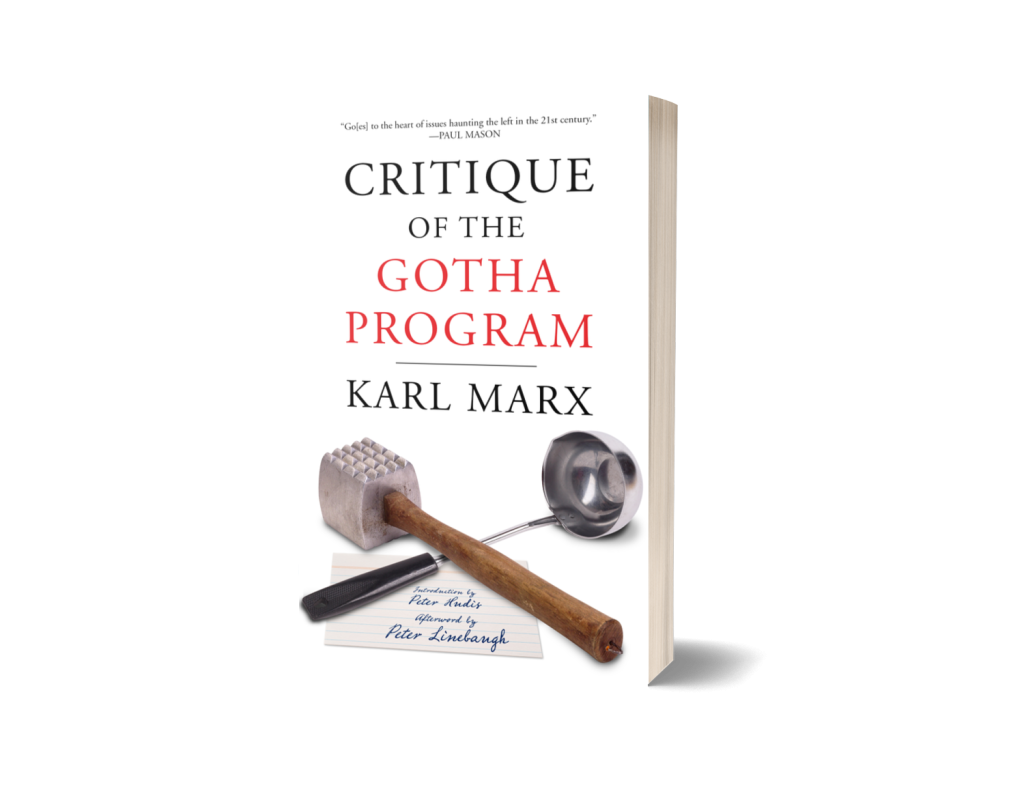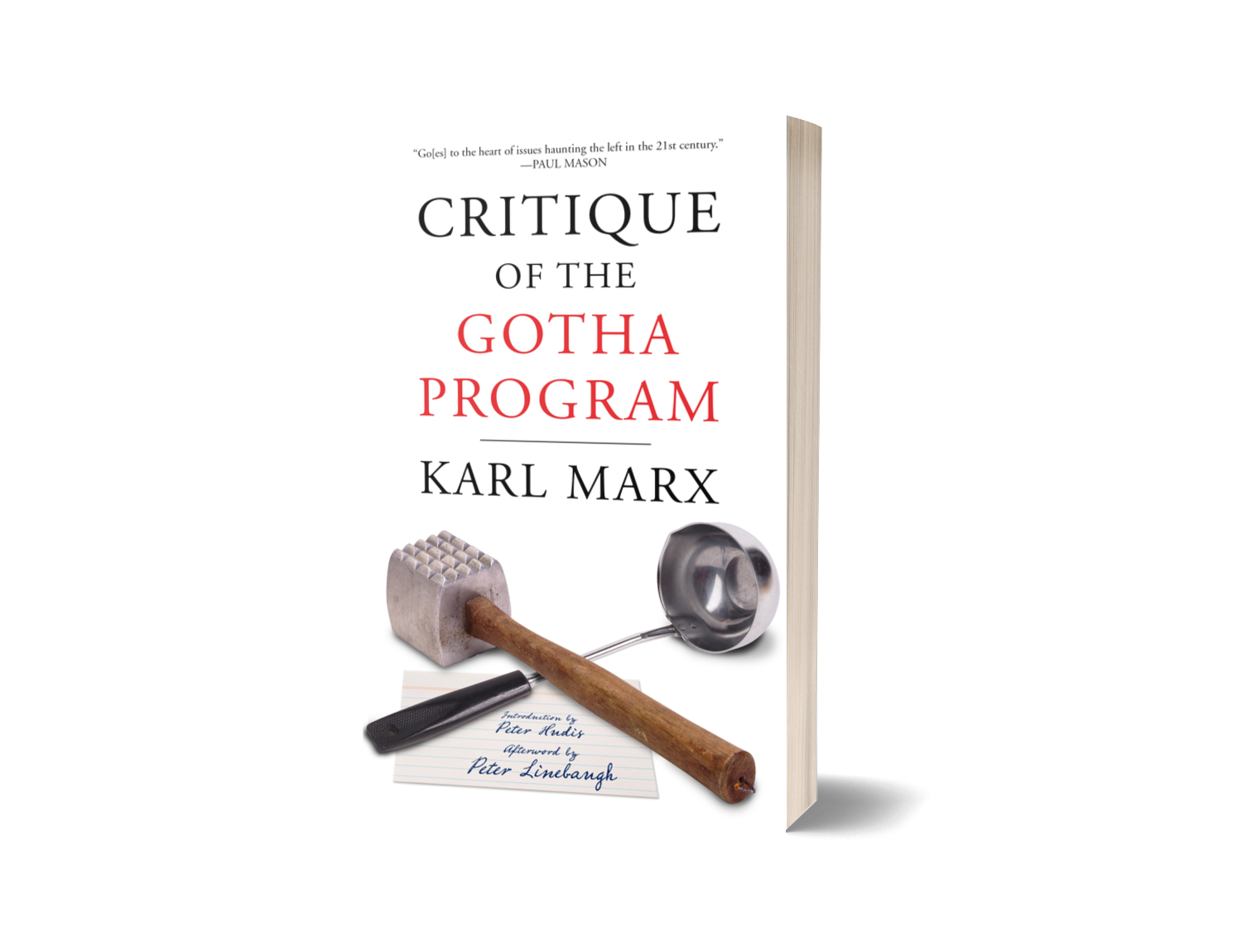By David Black
Marx & Philosophy Review of Books
This new edition of Marx’s 1875 Critique of the Gotha Program comes with a few surprises in translation for Marxists who have previously interpreted it as justification for the continuation of wage-labour and commodity production, under the ‘dictatorship of the proletariat’ in the ‘first phase’ of socialism/communism.
By the 1870s, there were two main socialist parties in Germany: the Social Democratic Workers’ Party, founded under the leadership of Marx’s collaborator, Wilhelm Liebknecht, at a congress in Eisenach in 1869, and the General German Workers Association, founded by the late Ferdinand Lassalle in 1863. In 1875 the two parties were fused into Socialist Workers Party of Germany at a congress in Gotha. The new party, following the repeal of the Anti-Socialist Laws, was to change its name in 1890 to the Social Democratic Party of Germany, which today leads the German coalition government in alliance with the Greens and the Liberals.
Shortly before the Gotha congress, Marx sent a critique of the draft program from London to his colleague, Wilhelm Bracke in Brunswick, for distribution to Liebknecht and other leaders of the ‘Eisenachers’. Marx’s accompanying letter to Bracke states bluntly that he and Engels ‘disassociate ourselves from said program’s principles and have nothing to do with it.’ (47) The very first sentence of the Gotha Program set off the alarm bells: ‘Labor is the source of all wealth and all culture, and since useful labor is possible only in society and through society, the proceeds of labor belong undiminished with equal right to all members of society.’ (51)
On the contrary, writes Marx, ‘[l]abor is not the source of all wealth.’ Nature was just as much the source of material wealth; and labor, as human labor-power, was itself ‘only the manifestation of a force of nature.’ Those with the means to buy the workers’ labor-power falsely ascribed to it a ‘supernatural creative power.’ It was false because ‘the human being who possesses no other property than his labor power’ must be, as always, ‘the slave of other human beings who have made themselves the owners of the material conditions of labor.’ (51-52)
Marx’s comrades in Germany had allowed Lassalle’s theory of the ‘iron law of wages’ to be incorporated into the new program. Inspired by Malthusian political economy, the theory held that although real wages might rise temporarily, they would always fall back to the minimum subsistence level because the market price of labor would inexorably be reduced as the working population increased.
If Lassalle had been right, class struggle between bosses and workers at the point of production would surely have been pointless. Because the Lassalleans could only appeal to the state for the abolition of capitalism, capitalists didn’t see the Lassalleans as much of a threat, now that the Bismarckian state already had a strong bourgeois component. Nor did the land-owning nobility fear the Lassallaen party. After all, as Marx was aware, Lassalle had, in 1862, assured Bismarck that his prospective party stood opposed only to the capitalist class, and had no intention of taking on the landowners and the Junker-dominated state.
Marx points out that bourgeois economists had long seen Lassalle’s theory as conceding that ‘socialism cannot abolish poverty, which has its basis in nature, but can only make it general, distributing it simultaneously over the whole surface of society!’ To adopt Lassalle’s ‘law’ was a ‘truly outrageous retrogression’ which ignored the development within ‘our party’ of ‘the scientific understanding that wages are not what they appear to be, namely the value of labor with respect to its price, but only a masked form for the value of labor power with respect to its price.’ (64) Marx argues in Capital that in proportion to the accumulation of capital, the lot of the labourer could only grow worse, ‘be his payment high or low’. Accumulation, in equilibrating the industrial reserve army, ‘rivets the worker to capital more firmly than the wedges of Hephaestus that held Prometheus to the rock. It makes an accumulation of misery a necessary condition, corresponding to the accumulation of wealth.’ (Marx 1976: 799)
Not only did the authors of the Gotha Program adopt Lassalle’s ‘iron law’, they also bought into his ‘solution’. In Marx’s words, ‘[a]fter the Lassallean “iron law of wages” […] the establishment of producers’ cooperative societies with state aid under the democratic control of the working people’ was to be enacted ‘on such a scale that the socialist organization of the total labor will arise from them.’ This substituted the role of the state for the revolutionary process of transforming society: ‘It is worthy of Lassalle’s imagination that with state loans one can build a new society as easily as a new railway!’ (66)
Marx, with an eye on actual class struggles, insists: ‘Every step of real movement is more important than a dozen programs.’ His comrades had put the cart before the horse by drawing up a program of principles in advance of activity. It would have been better to ‘simply have concluded an agreement for action against the common enemy.’ (81)
The Gotha Program claimed that the necessary result of its efforts would be ‘the international brotherhood of peoples’. Yet, as Marx pointed out, the program’s commitment to internationalism stood ‘infinitely below even that of the free trade party’. For the free trade liberals, international brotherhood actually involved doing something practical to make trade international. (63)
The Program called for establishment of a ‘free state’. But Marx did not think it was the job of the workers to set the state ‘free’. He poses the question: ‘What transformation will the body politic [Staatswesen] undergo in communist society? In other words, what social functions analogous to present state functions [Staatsfunktionen] will remain at that juncture?’ (68)
All previous English translations have rendered Staatswesen as ‘state’. However, as Peter Hudis writes in the introduction, to speak of ‘the form of the state’ in this context is a mistranslation: ‘The original does not speak of the “form of the state” in communism; it speaks of former state functions (Staatswesen — not Staat) that can readily be employed without a state. This is made clear by the next sentence: “In other words, what social functions analogous to present state functions will remain at that juncture?”’ (33)
One reason that Marxists downplay the importance of the Critique of the Gotha Program has been their belief that Marx’s organizational prescriptions were superseded by Lenin’s theory and practice of ‘democratic centralism’ and the vanguard party-to-lead. Another reason has been the equation of the revolutionary dictatorship of the proletariat with a first stage of communism, which would nevertheless be characterized by commodity production and wage labor. But Marx is quite clear that the revolutionary dictatorship of the proletariat is simply the means by which commodity production and wage labor (and the state) are abolished. Within a cooperatively organized society, the labor expended does not appear as the value of the product, ‘since now, in contrast to capitalist society, individual labor no longer exists in an indirect fashion but directly as a component part of total labor.’ (57)
How this principle might operate in a modern society, in which the work process is infinitely more diversified, with occupations and professions unheard of or in their infancy during Marx’s time? It is quite conceivable that some groups of workers might argue that having spent years in training, they are entitled to receive more than those who haven’t. In such cases, in order to prevent the growth of a black market for certain goods and services, it might be seen as expedient to compromise by increasing their pay. The difference with capitalism would be that the arrangement would be transparent – and debatable.
Marx signs off his critique in Latin: ‘Dixi et salvavi animam meam [I have spoken and saved my soul]’. Peter Linebaugh, in the Afterword to this new edition, asks, from the point of view of a historical materialist: ‘What is Marx’s soul? How did he save it? And what about ours?’ (79) Linebaugh believes that today ‘[w]e are present at the edge of the abyss staring into the “ecological rift”’ He hopes that the ‘risings among black and brown people, women, indigenous peoples, and the rebels against extinctions’ will become components of ‘the real movement’ that conquers as well as resists: ‘We can pluck the living flower to re-create the commons.’ (81-82)
Marx knew of no historical experience that could provide a ‘guide’ to a successful revolution. As Hudis puts it: ‘Marx does not give us the “answer” as to how to build a new society, but his work points us in an important direction […] in developing revolutionary perspectives for the actual transcendence of capitalism.’ (35)
Marx’s critique of his own followers still resonates after 150 years. To conclude, if there is one thing that the left should have learned by now is that the socialist cause cannot be advanced by offering a half-way house in which goals are supposedly balanced against ‘realities’, such as the ability of capitalists to retaliate by capital flight and other means. If socialists know full well that capitalists have the power to derail their project, then keeping quiet about it in order to get elected or lead the next big demo can only lead to retreat, capitulation and disillusionment. If the left would desist from touting a vaguely-defined ‘socialism’ they can’t deliver, but nonetheless promote fruitful resistance, they might be taken seriously enough to help develop ‘revolutionary perspectives for the actual transcendence of capitalism.’ (35)
10 February 2023
References
- Karl Marx 1976 Capital: A Critique of Political Economy, Volume 1 trans. Ben Fowkes, London: Penguin.







